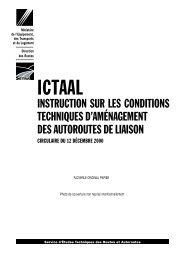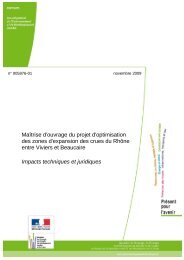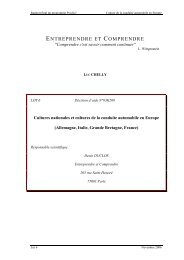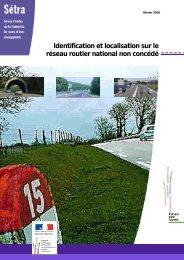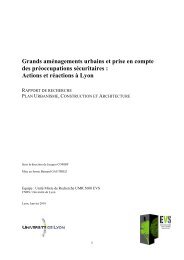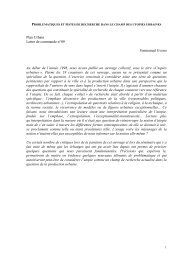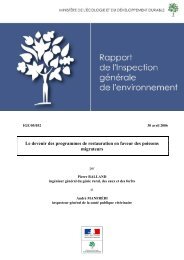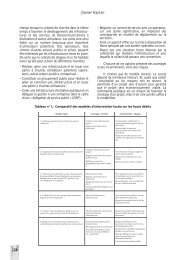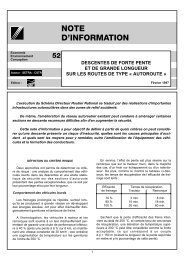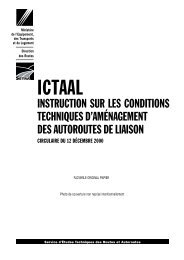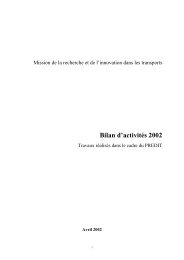des tic et des territoires - Portail documentaire du ministère de l ...
des tic et des territoires - Portail documentaire du ministère de l ...
des tic et des territoires - Portail documentaire du ministère de l ...
You also want an ePaper? Increase the reach of your titles
YUMPU automatically turns print PDFs into web optimized ePapers that Google loves.
TELEWORK IN THE SCENARIOS FOR THE FUTURE OF WORK<br />
This paper proposes to analyse the current and<br />
future trends in the <strong>de</strong>velopment of telework, in<br />
relation to scenarios of the future of work in the<br />
information soci<strong>et</strong>y.<br />
1. First of all we will point out some key issues in the<br />
studies of the future of work in the information<br />
soci<strong>et</strong>y: the <strong>de</strong>materialisation of the economy, the<br />
increasing search for flexibility in organisation,<br />
some new trends in human resources management.<br />
These issues are par<strong>tic</strong>ularly relevant as<br />
regards to the <strong>de</strong>velopment of telework.<br />
2. A second section will examine the current trends<br />
in the <strong>de</strong>velopment of telework. It will point out<br />
that the most wi<strong><strong>de</strong>s</strong>pread forms of telework are<br />
not home-based telework as such, but new forms<br />
of organisation of work based on communication<br />
technology, for instance: mobile telework, new<br />
distance working companies, “mixed” telework<br />
combining various workplaces on irregularly<br />
basis. The common characteris<strong>tic</strong> of these forms<br />
of organisation is the search of flexibility.<br />
3. Finally we will discuss an important challenge for<br />
the future of work: how to <strong>de</strong>velop flexible telework<br />
patterns avoiding a d<strong>et</strong>erioration of working conditions<br />
? What can be a social scenario of flexibility ?<br />
This challenge is not specific to telework, but par<strong>tic</strong>ularly<br />
enhanced with the <strong>de</strong>velopment of telework.<br />
Given the diversification of forms of telework<br />
(home-based telework, mobile work, call centres,<br />
<strong>et</strong>c.), we will often use the expression distance working,<br />
although “tele” and “distance” are objectively<br />
synonymous. The expression distance working has<br />
fewer connotations that the term telework and it is<br />
more representative of diversity. Mobile work and<br />
distance working companies, for example, are rarely<br />
mentioned un<strong>de</strong>r the telework label, but they are<br />
entirely significant for the purposes of this paper.<br />
Visions of the Future of Work in the<br />
Information Soci<strong>et</strong>y<br />
In the literature and <strong>de</strong>bates about the future of<br />
work in the information soci<strong>et</strong>y, a s<strong>et</strong> of common<br />
trends is usually analysed. They mainly concern<br />
<strong>de</strong>materialisation, skills, knowledge and training,<br />
flexibility. The scenarios of the future of work also<br />
examine more fundamental changes in soci<strong>et</strong>y: new<br />
<strong>de</strong>finitions of the concepts of work, employment<br />
and activity; working time arrangement and re<strong>du</strong>ction;<br />
the challenge of regulation. In this section, we<br />
will briefly present some of these trends that are<br />
par<strong>tic</strong>ularly relevant as regards to the <strong>de</strong>velopment<br />
of telework or distance working:<br />
– the <strong>de</strong>materialisation of economy;<br />
– the restructuring of service activities;<br />
– the new emphasis on knowledge and comp<strong>et</strong>ence;<br />
– the <strong>de</strong>velopment of flexible organisation and flexible<br />
labour mark<strong>et</strong>s.<br />
This overview of the scenarios of the future of<br />
work and the discussion about flexibility mainly<br />
refer to the first report of the FLEXCOT project<br />
(Flexible work prac<strong>tic</strong>es and communication technology)<br />
for the TSER programme of the European<br />
Commission [Valen<strong>du</strong>c & al., 1998].<br />
A Dematerialised Economy<br />
Patricia VENDRAMIN<br />
Fondation travail Université<br />
Neither technological changes nor the promotional<br />
campaigns of the European Commission are<br />
enough to explain the expansion and diversification<br />
of forms of distance working. The real cradle of<br />
telework lies in certain major changes in the economy,<br />
and more par<strong>tic</strong>ularly in services, mainly the<br />
ten<strong>de</strong>ncy towards the <strong>de</strong>materialisation of economy<br />
and the restructuring of service activities.<br />
This <strong>de</strong>materialisation of economy is shown in<br />
the growing share of non-material activities in economic<br />
activity, characterised by:<br />
– Growing immaterial pro<strong>du</strong>ction and consumption:<br />
the mark<strong>et</strong> for information pro<strong>du</strong>cts and<br />
services, like software, multimedia, teleservices, is<br />
growing faster than mark<strong>et</strong>s for material equipment<br />
and goods.<br />
– An increasing number of persons are employed in<br />
the pro<strong>du</strong>ction and distribution of information,<br />
knowledge, cultural and leisure activities, whereas<br />
employment in the pro<strong>du</strong>ction of material equipment<br />
and goods is <strong>de</strong>creasing.<br />
– Companies draw greater profit from their nonmaterial<br />
activities than from their directly pro<strong>du</strong>ctive<br />
activities, via their financial engineering,<br />
financial investments, maintenance, advice and<br />
service activities.<br />
81



